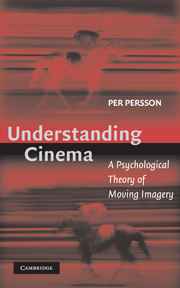Book contents
- Frontmatter
- Contents
- List of Illustrations
- Preface and Acknowledgments
- Understanding Cinema
- 1 Understanding and Dispositions
- 2 Understanding Point-of-View Editing
- 3 Variable Framing and Personal Space
- 4 Character Psychology and Mental Attribution
- 5 The Case for a Psychological Theory of Cinema
- Notes
- References
- Index
Preface and Acknowledgments
Published online by Cambridge University Press: 15 July 2009
- Frontmatter
- Contents
- List of Illustrations
- Preface and Acknowledgments
- Understanding Cinema
- 1 Understanding and Dispositions
- 2 Understanding Point-of-View Editing
- 3 Variable Framing and Personal Space
- 4 Character Psychology and Mental Attribution
- 5 The Case for a Psychological Theory of Cinema
- Notes
- References
- Index
Summary
A number of people have contributed to this project. Although I have exposed my supervisor, Jan Olsson, to many long and tedious texts over the years, he has patiently endured and given fast feedback in the intelligent and verbally equilibristic way that is only his. In the same spirit, many fellow students and teachers at the colloquium in the Department of Cinema Studies, Stockholm University, have given me constructive criticism when it was best needed. I would like to express my thanks to David Bordwell, who took the time to read and comment on some of my draft chapters and inspired me academically with his lectures and professionalism. David Modjeska's meticulous revision of my English provided invaluable help, and his corrections often led to clarifications of content. Younghee Jung and my brother, Ola Persson, delicately provided the form and layout of the book. Maxime Fleckner Ducey granted me access to the archives of Wisconsin Center for Film and Theater Research, from which most of the photographic material in this book originates. The staff at the Department of Cinema Studies helped me with technical and economical matters all through the project. The Sweden–America Foundation allowed me the financial means to stay abroad for a year. Additional funding was provided for by Holger och Thyra Lauritzens Stiftelse, Wallenbergsstiftelsens Jubileumsfond, Run-Jannes Stipendium, and the Swedish Institute of Computer Science. I would also like to express my gratitude to all people at the HUMLE lab at the Swedish Institute of Computer Science for their generous support and constructive discussions.
- Type
- Chapter
- Information
- Understanding CinemaA Psychological Theory of Moving Imagery, pp. xi - xiiPublisher: Cambridge University PressPrint publication year: 2003



